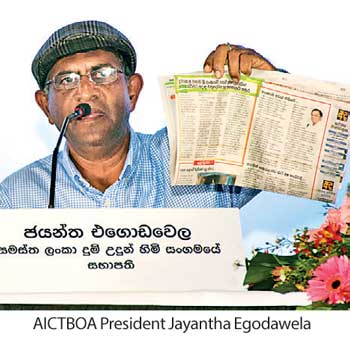19 Mar 2018 - {{hitsCtrl.values.hits}}
 By Chandeepa Wettasinghe
By Chandeepa Wettasinghe
The government’s plans to ban tobacco farming in Sri Lanka by 2020 is being quietly fast-tracked for prohibition this year, the President of the All Ceylon Cigarette Tobacco Barn Owner’s Association (AICTBOA) said recently.
“We were told that we would be allowed to farm tobacco until 2020 by which time an alternative would be introduced. But we saw on February 28 in the Ada newspaper that tobacco cultivation would be banned by Yala season 2018. Sources have also told us that this circular is going to be signed,” Jayantha Egodawela said.
He accused the government of lying to the farmers for the past few years.
“So, the government is lying. The Agriculture Ministry and the Presidential Task Force say one thing. The Health Ministry now says another. We have sent letters requesting them to stop this move and to come for discussions, but we haven’t got a response,” he said.
However, he said that some bureaucrats at the secretarial level do not want the message to go up to top politicians such as the Prime Minister and the President and are withholding information.
“The message never gets to the required person. If we keep going after the government, it will be too late. They would have signed the circular by then. So when this appears on the newspapers, they might ask why we dealt with the media instead of with them directly. Then we will enlighten them,” Egodawela said.
He vowed that if the current efforts of the farmers don’t generate results, they will protest in the streets, much like any other group of people who have sought government action in the recent past.
Around 20,000 farmers supply tobacco to the only locally licensed cigarette manufacturer Ceylon Tobacco Company PLC, while the agricultural phase generates 60,000 additional direct and indirect employment.
Altogether, when dependents of those employed in tobacco farming are taken into account, nearly 300,000 Sri Lankans would be affected if the government bans tobacco farming this year.
The Agriculture Department had promised these farmers—who cultivate paddy during the Maha season, and farm tobacco during the Yala season—an alternative crop, which could generate the same level of profits for them as farming tobacco. However, none of the experimented crops have been successful in generating around Rs.300,000 in net profits for the farmer per hectare.
Further, the CTC buys back the tobacco from the farmer at an average price, thereby not making the farmer a victim of the vagaries of the weather.
“If the government wants us to go for an alternative, they have to prove it and do it. Buy the crops back at a guaranteed price. Saying it doesn’t matter. Do it and show it,” Egodawela said.
He added that if tobacco consumption was banned from the country, the farmers would be happy, but such an action would never happen, and the farmers would become victims of the ban on tobacco farming.
“You can’t carry this country forward without tobacco, because of the tax contribution of the industry. This is the second highest taxpayer. So they will allow foreign tobacco and cigarettes to be imported. The companies will go on. Only we farmers will suffer,” he said.
He said that cigarette tobacco farming, done independently, without subsidies, like paddy and vegetable farming, and done with extreme quality control, has always been subjected to higher taxes and regulations.
“But 55 percent of tobacco consumed in the country is cigars and beedi. They aren’t controlled for quality or subjected to as much tax as us,” he said.
19 Nov 2024 24 minute ago
19 Nov 2024 3 hours ago
18 Nov 2024 18 Nov 2024
18 Nov 2024 18 Nov 2024
18 Nov 2024 18 Nov 2024